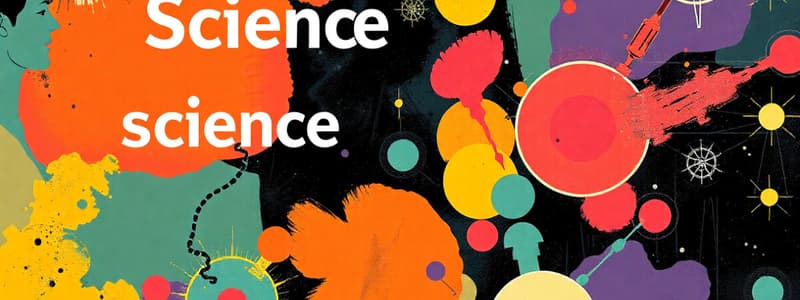Podcast
Questions and Answers
What is the primary aim of science as described?
What is the primary aim of science as described?
- To develop new technologies
- To understand and explain phenomena (correct)
- To predict future events
- To create art and culture
Which of the following fields is considered a part of the natural sciences?
Which of the following fields is considered a part of the natural sciences?
- Chemistry (correct)
- Sociology
- Mathematics
- Psychology
What is the correct sequence of steps in the scientific method?
What is the correct sequence of steps in the scientific method?
- Hypothesis, Conclusion, Observation, Experiment, Analysis, Research
- Experiment, Observation, Research, Hypothesis, Analysis, Conclusion
- Observation, Research, Hypothesis, Experiment, Analysis, Conclusion (correct)
- Observation, Research, Hypothesis, Analysis, Conclusion, Experiment
Which definition best describes a scientific law?
Which definition best describes a scientific law?
How does science influence society?
How does science influence society?
Flashcards are hidden until you start studying
Study Notes
Definition of Science
- Systematic study of the natural world through observation and experimentation.
- Aims to understand and explain phenomena.
Branches of Science
-
Natural Sciences
- Focus on the physical world.
- Includes:
- Physics: Study of matter and energy.
- Chemistry: Study of substances and their interactions.
- Biology: Study of living organisms.
-
Formal Sciences
- Abstract concepts and logical reasoning.
- Includes:
- Mathematics: Study of numbers, quantities, and shapes.
- Logic: Study of valid reasoning.
- Statistics: Study of data collection and analysis.
-
Social Sciences
- Study of human behavior and societies.
- Includes:
- Psychology: Study of the mind and behavior.
- Sociology: Study of societies and social relationships.
- Economics: Study of production, distribution, and consumption.
Scientific Method
- Process for investigation and discovery:
- Observation: Identify a problem or question.
- Research: Gather existing information.
- Hypothesis: Formulate a testable prediction.
- Experiment: Conduct tests to gather data.
- Analysis: Evaluate results and determine if hypothesis is supported.
- Conclusion: Draw conclusions and share findings.
Key Concepts
- Theory: Well-substantiated explanation based on repeated testing (e.g. Theory of Evolution).
- Law: Statement that describes a consistent natural phenomenon (e.g. Law of Gravity).
- Hypothesis: A tentative explanation that can be tested.
Importance of Science
- Advances knowledge and technology.
- Provides a framework for understanding the natural world.
- Informs decision-making and policy development.
- Promotes critical thinking and problem-solving skills.
Science and Society
- Influences various sectors like health, environment, and technology.
- Collaborates with ethics to address impacts of scientific developments.
- Encourages public understanding of scientific principles and literacy.
Definition of Science
- Science is a systematic way of studying the natural world using observations and experimentation. Its primary goal is to understand and explain phenomena.
Branches of Science
- Natural Sciences focus on the physical world, including physics, chemistry, and biology.
- Physics studies matter and energy.
- Chemistry examines substances and their interactions.
- Biology focuses on living organisms.
- Formal Sciences deal with abstract concepts and logical reasoning, including mathematics, logic, and statistics.
- Mathematics studies numbers, quantities, and shapes.
- Logic explores valid reasoning.
- Statistics analyzes data collection and analysis.
- Social Sciences investigate human behavior and societies, including psychology, sociology, and economics.
- Psychology explores the mind and behavior.
- Sociology studies societies and social relationships.
- Economics investigates production, distribution, and consumption.
Scientific Method
- The scientific method is a structured approach to investigation and discovery.
- Observation: Identify a problem or question.
- Research: Gather existing information.
- Hypothesis: Formulate a testable prediction.
- Experiment: Conduct tests to gather data.
- Analysis: Evaluate results and determine if the hypothesis is supported.
- Conclusion: Draw conclusions and share findings.
Key Concepts
- Theory: A well-substantiated explanation based on repeated testing (e.g., Theory of Evolution).
- Law: A statement that describes a consistent natural phenomenon (e.g., Law of Gravity).
- Hypothesis: A tentative explanation that can be tested.
Importance of Science
- Science advances knowledge and technology.
- It provides a framework for understanding the natural world.
- It informs decision-making and policy development.
- Science promotes critical thinking and problem-solving skills.
Science and Society
- Science influences various sectors like health, environment, and technology.
- Science collaborates with ethics to address the impacts of scientific developments.
- Science encourages public understanding of scientific principles and literacy.
Studying That Suits You
Use AI to generate personalized quizzes and flashcards to suit your learning preferences.




